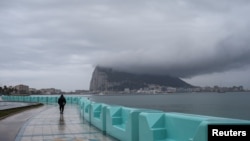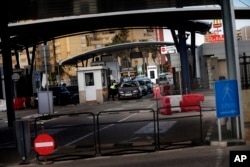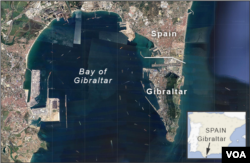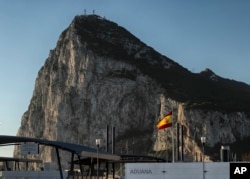Few stand to be as affected by a no-deal Brexit as the 34,000 Gibraltar residents and the Spanish communities around the British overseas colony known as the Rock. They're bracing for dramatic consequences if Britain leaves the EU with no deal to govern the breakup due March 29.
Under Prime Minister Teresa May's Brexit agreement, voted down by the British parliament this month, the unrestricted access between Spain and Gibraltar currently enjoyed by thousands of Gibraltarians, Spaniards and tourists moving across the border each day would have been guaranteed.
But in a no-deal scenario, EU free-movement agreements no longer apply, according to Spanish foreign ministry officials. They say that Gibraltarians will be treated as any other third country citizens and subjected to whatever questioning and border checks that Spain decides to impose.
"They tried pressing us before and with Brexit are sure to try it again," says a Gibraltar taxi driver who remembers seven-hour traffic lines at the narrow isthmus separating the Rock from Spain during several disputes between 2012 and 2014.
One of Spain's leading officials at the time, former Foreign Minister Antonio Margallo, called Brexit an "opportunity" for Spain to recover Gibraltar in remarks after the Brexit referendum results were released in 2017.
Recent aggressive patrols around the peninsula territory by a Spanish navy corvette – blaring Spain's national anthem – has served, to observers, as a shrill reminder of Madrid's intentions.
Insurance concerns
Special EU delegations shuttled to Spain to lean on Spanish authorities to ease border restrictions during previous disputes over alleged money laundering and smuggling. But no such rescue attempts are on the horizon post-Brexit and preparations are under way for worst-case scenarios.
The local government has advised Gibraltarians to immediately renew British passports if they expire within six months, obtain special international driver's licenses being issued locally for the first time, and purchase travel insurance amid fears that they will no longer be covered under Britain's National Health Service.
Possible counter measures are also being prepared against Spain, according to a Gilbraltarian who works for the British immigration service and spoke to VOA on condition of anonymity. The official said passport checks may be imposed on more than 13,000 Spanish workers whose jobs in Gibraltar tend to be well paid and provide a vital source of revenue for the economically depressed region of southern Andalusia.
Passports may be needed
Spanish construction workers interviewed at the border fence told VOA they will have to get passports for the first time.
"There are going to be a lot of problems here," said one worker who identified himself as Salvador.
"It's going to be awful," added his friend.
Unemployment in their hometown of La Linea is among the highest in Spain. Unlike much of Spain's southern coast, tourism never developed along the border zone where the economy was sustained by a petrochemical complex built by the late ruler Francisco Franco when he closed the border in 1968.
The border fence was reopened when Spain joined the EU in the 1980s. The free movement of people and goods led to a doubling of Gibraltar's GDP as the territory was transformed from a military base to an international financial center.
"Brexit is pulling us into a conflict that we don't want and don't need," said Jonathan Sacramento, a news editor at the Gibraltar Broadcasting Corp.
Companies on the move
Chief Minister Fabian Picardo plays down worries because 94 percent of Gibraltar's trade is with Britain. But a number of international banks, insurance companies and other financial institutions, as well as online casinos, have announced plans to pull out.
Denmark's Jyske Bank specifically cited Brexit as the reason for closing operations in Gibraltar the day after last Tuesday's parliamentary vote.
One of the largest online gaming services, Simon Hill, has also announced it is relocating to Malta.
Most Gibraltarians, who have voted by 98 percent to remain British in two recent referendum, remain defiant.
"We will survive another blockade just as we survived past ones," said Robert Buhagiar, a British defense worker on the territory.
Contingency plans in works
A source close to the Gibraltar government said that contingency plans are under way for bringing food and guest workers from Morocco, lying just an hour's ferry ride across the Strait of Gibraltar.
Local government officials doubt matters will go that far, pointing out that Britain and Spain have settled their differences in the past through negotiation.
They are now making efforts to establish political ties with the regional government of Andalusia, whose leaders have met with Picardo twice over the past year to try to minimize disruptions after Brexit.
But Brexit is coinciding with a period of political uncertainty in Spain, and the prospect of a right-wing government emerging from elections this year with support from VOX, a new ultranationalist party.
Reminder of dispute
In 2016, some of the party's leaders were arrested after carrying a mock raid on Gibraltar and hoisting a giant Spanish flag on the north side of the Rock.
The action was a reminder of a dispute between two former colonial powers that has festered for centuries and may be on the verge of reigniting.
For some in Madrid, the current state of affairs is a chance to once again raise the issue. British media reports, quoting leaked documents, say Spain is calling on the EU to acknowledge that a dispute between the two nations exists — in the event that Britain ends up leaving the EU as scheduled, without an exit deal.









